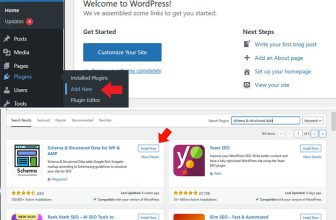
Meta tags play a crucial role in improving your website’s SEO. These small snippets of code provide search engines with information about your page, influencing how your content is indexed and displayed in search results. In this guide, we’ll explore how to add meta tags to WordPress posts, both manually and automatically, using plugins and custom code.
What Are Meta Tags?
Meta tags are HTML elements that provide metadata about your webpage. Common types of meta tags include:
- Title tags: The clickable headline shown in search engine results.
- Meta descriptions: A brief summary of the page content.
- Meta keywords: Keywords relevant to your page (less commonly used today).
By optimizing these tags, you can improve your content’s visibility in search engine results pages (SERPs).
Adding Meta Tags to WordPress Posts
1. Using Plugins to Add Meta Tags Automatically
Plugins are the easiest way to manage meta tags in WordPress. Here are some popular free and paid options:
Free Plugins
- Yoast SEO
- Features: Automatically generates meta tags, allows custom meta descriptions, and provides readability analysis.
- Use Case: Ideal for beginners who want a comprehensive SEO solution.
- Rank Math
- Features: Offers detailed meta tag customization, keyword suggestions, and an intuitive setup wizard.
- Use Case: Suitable for users looking for advanced SEO features for free.
- All in One SEO Pack
- Features: Automatically adds meta tags, supports schema markup, and includes basic SEO tools.
- Use Case: Great for users wanting a straightforward SEO plugin.
Paid Plugins
- SEOPress Pro
- Features: Customizable meta tags, advanced schema options, and integration with Google Analytics.
- Price: Starts at $49/year.
- Use Case: Ideal for professionals managing multiple websites.
- Premium SEO Pack
- Features: Offers advanced meta tag options, social meta integration, and image optimization tools.
- Price: Starts at $44 (one-time fee).
- Use Case: Perfect for those needing a single plugin with comprehensive SEO tools.
2. Adding Meta Tags Manually Using Plugins
Some plugins allow you to manually enter meta tags for individual posts and pages. Here’s how to do it with Yoast SEO:
- Install and Activate Yoast SEO: Go to your WordPress dashboard > Plugins > Add New, search for “Yoast SEO”, and install it.
- Edit a Post: Open a post in the editor.
- Scroll to the Yoast SEO Meta Box: Enter your preferred title tag and meta description in the provided fields.
- Save or Update Your Post: Click the “Update” button to save your changes.
Adding Meta Tags to WordPress Themes (functions.php)
If you prefer a hands-on approach, you can add meta tags directly to your WordPress theme. Here’s how:
Step-by-Step Guide
- Access the Theme Editor:
- Navigate to WordPress Dashboard > Appearance > Theme Editor.
- Locate the
functions.phpfile.
- Add the Following Code:
function add_meta_tags() {
if (is_single()) {
global $post;
$meta_description = strip_tags(get_the_excerpt($post->ID));
$meta_keywords = get_post_meta($post->ID, 'meta_keywords', true);
echo '<meta name="description" content="' . esc_attr($meta_description) . '" />';
if ($meta_keywords) {
echo '<meta name="keywords" content="' . esc_attr($meta_keywords) . '" />';
}
}
}
add_action('wp_head', 'add_meta_tags');Explanation:
is_single(): Ensures the meta tags are added only to single posts.get_the_excerpt(): Retrieves the post excerpt for the meta description.get_post_meta(): Fetches custom meta keywords if they exist.
- Save Changes: Once the code is added, save the
functions.phpfile.
Best Practices for Meta Tags
- Keep Meta Descriptions Concise: Aim for 150-160 characters.
- Use Target Keywords: Naturally integrate your primary keywords.
- Avoid Keyword Stuffing: Focus on readability and relevance.
- Test with SEO Tools: Use plugins or tools like Google’s Rich Results Test to verify your meta tags.
Conclusion
Adding meta tags to your WordPress posts is essential for improving search engine rankings. Whether you choose a plugin for simplicity or custom code for flexibility, the right approach depends on your needs and technical expertise. Start optimizing your meta tags today to boost your website’s visibility and attract more visitors!





